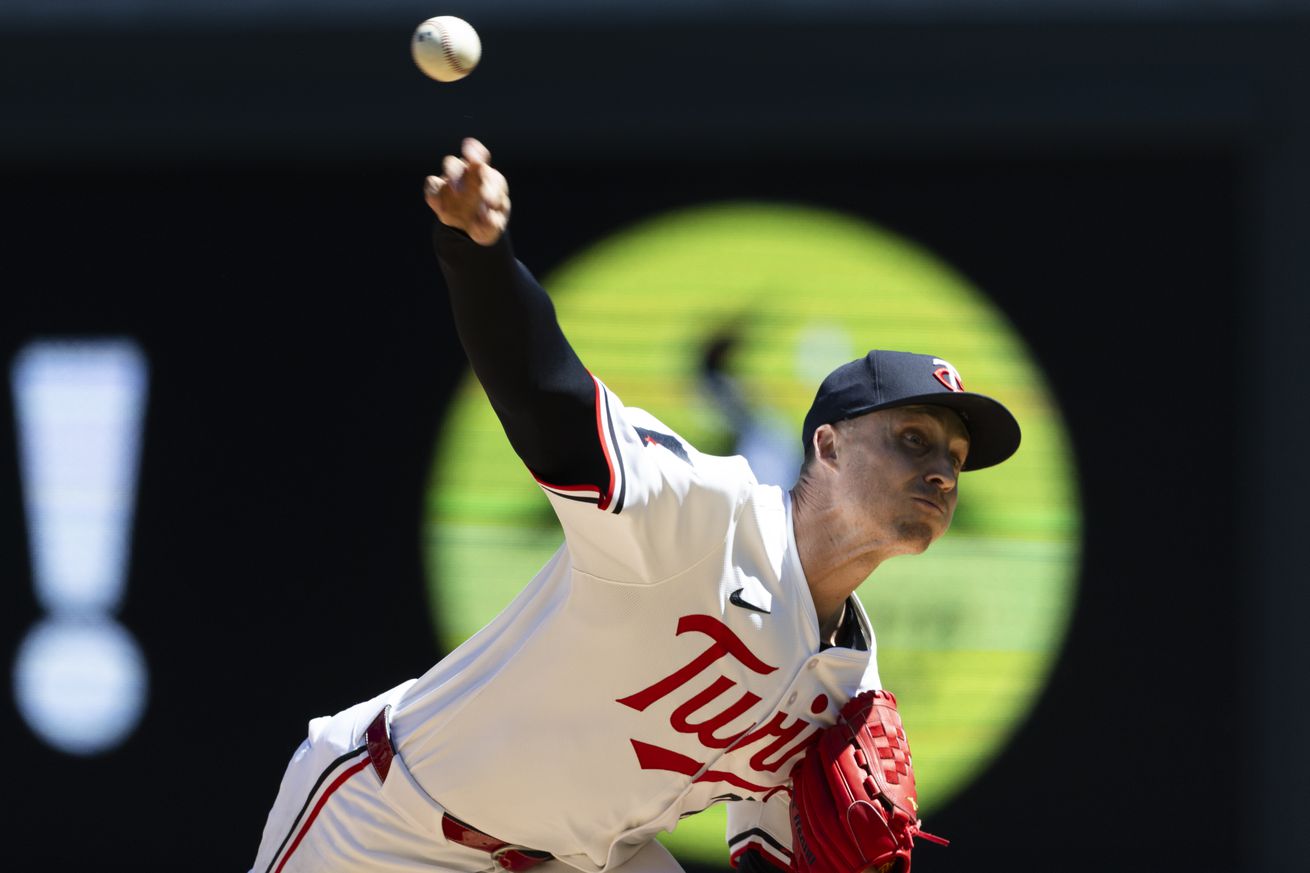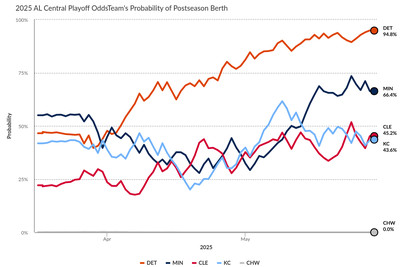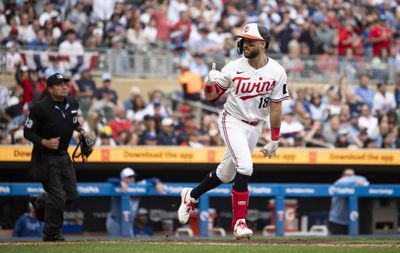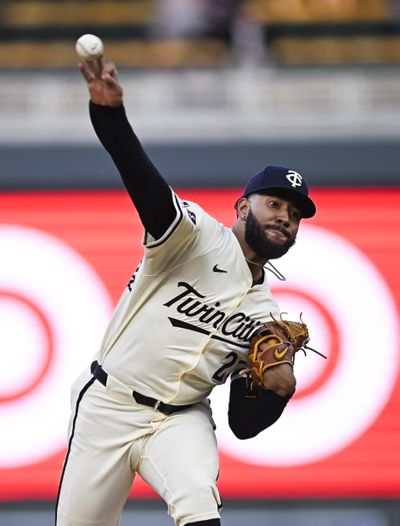
Playoff Odds, Expected Records, and Notes on Kody Clemens, SWR, Captain Jax, and the Three True Outcomes
There is a rule of thumb in baseball that you shouldn’t pay any attention to the standings until the end of May. While the standings at this point in the season do not guarantee anything when it comes to season’s end, teams that are well-positioned at this point in the schedule finish that way more often than not. According to Elias Sports Bureau data since 1995 (the beginning of the wild-card era), noted in an ESPN article earlier this week, 59% of division leaders on the morning of June 1 have gone on to win their division.
The Twins are not in first place in the AL Central standings, but they are now tied for 2nd place with Cleveland, six games behind Detroit as of this writing. That’s good enough for an American League wild card spot if the season were to end today and FanGraphs’ modeling shows the Twins have a roughly two-in-three chance to make the playoffs:

Visual from FanGraphs
As you can see in the chart above, those chances have more than doubled in the last month, thanks to a thirteen-game winning streak and solid all-around play that has the club 17-7 for the month.
Baseball-Reference is less optimistic about the Twins’ outlook, giving them a 29.6% chance of making the postseason. That was up above 42% before the Twins dropped two of three to the Rays, a team that Baseball-Reference’s modeling sees as in heated competition with the Twins for one of those American League wild card spots.
In terms of expectations, the Twins’ 30-25 mark is more or less in line with how they’ve played. By the Pythagorean method of estimating wins and losses based on runs scored and runs allowed, the Twins’ record should be 31-24. FanGraphs’ more involved BaseRuns method suggests they should be 29-26.
Here are some other notes of interest for your off-day enjoyment.
Kody Clemens
A significant portion of the Twins’ turnaround over the last month can be credited to the outstanding work of Kody Clemens, who joined the club via trade in the aftermath of Luke Keaschall’s forearm fracture near the end of April. All Clemens has done since joining the Twins is hit, batting .274/.366/.629 (.423 wOBA and 181 wRC+) across 72 plate appearances and 29 games.
While it is difficult to assess how much stock to put into a journeyman player who never had a top prospect outlook (despite his Hall of Fame father) having a torrid month, most of Clemens’ underlying data supports the way he’s performed.
His BABIP with the Twins is .324, elevated some, but not outrageously so.
More importantly, he’s hit the absolute crap out of the ball. His 96.2 mph average exit velocity is about 7 mph better than his previous career-best and up near the league’s best. His 9.7% barrel-per plate appearance is almost double his previous work, and his 62.8% hard hit rate is up about 20 percentage points. Those contact quality data points are supported by a faster swing. His average swing speed is 72.8 mph, up 1.3 mph over last season.

Photo by Stephen Maturen/Getty Images
At the same time, he’s chasing less, whiffing less, handling breaking balls and offspeed pitches better than ever, and pulling the ball in the air more often. He’s taken his walks and struck out at a tolerable rate.
I wouldn’t want to bet that he’ll continue to lead the club in offensive production, let alone that he’d continue besting Shohei Ohtani and Aaron Judge, especially if he needs to transition back to more of a part-time bench role as the Twins roster gets healthier. But these are all the signs of a guy who’s figuring it out and making the most of an extended opportunity. It couldn’t have come at a more important time for the 2025 Twins.
Simeon Woods-Richardson
One of the players no longer with the big league club is young starter Simeon Woods-Richardson, who was optioned to St. Paul following a short start in Baltimore earlier this month. SWR, who was a revelation last season after lowering his arm slot and gaining several ticks of velocity, had struggled to a 5.02 ERA and 5.25 FIP across seven starts to begin this season.
A major challenge for Woods-Richardson this season had been left-handed hitters, who had hit .347/.400/.569 with 8 extra base hits against him. The main culprit for that was SWR’s ineffective changeup. The pitch was far and away MLB’s least effective last season (-16 run value, allowed .417 wOBA), and those issues continued this season (-5 runs) despite SWR using it about half as often.

Photo by Stephen Maturen/Getty Images
As a prospect, Woods-Richardson’s changeup had once been considered his best pitch, but the movement profile of the pitch was negatively affected by his arm slot change. The pitch gained significant horizontal movement with the arm angle change and was simply too easy to hit in the air and for power, especially if SWR wasn’t on point with where he located it.
In his last start with the Twins before his demotion, Woods-Richardson ditched his changeup and instead deployed a splitter that had a much greater north-south orientation. In his two starts with the Saints so far, SWR has thrown the new split 26 times, mostly to left-handed opponents, indicating that getting a feel for the new offspeed offering is a development priority.
You may recall that Joe Ryan had a similar challenge upon his arrival in Minnesota in 2021, although he scrapped a poorly performing changeup in favor of the split he now wields over the course of a couple of offseasons. In any event, the development of SWR’s splitter will be something to monitor and watch for when he inevitably returns to the Twins later this season.
Griffin Jax
When high-leverage reliever Griffin Jax walked off the mound in Atlanta on April 18, he’d gotten just one out, given up a run, and had loaded the bases while trying to protect a 3-run lead. Each of those runners would come around to score, leaving Jax with an 11.25 ERA over his first 9 appearances in 2025.
Jax has made 17 appearances since that day in Atlanta, across which he’s allowed only 2 runs (1.08 ERA) and sported a 29-2 strikeout to walk ratio. His FIP over this stretch is a minuscule 0.73, and Jax has punched out 46.8% of the batters he’s faced while allowing just a .183 batting average against.
A before-and-after comparison of pitch type usage reveals that Jax’s return to dominance coincides with a decreased emphasis on his fastballs and a renewed emphasis on his trademark sweeper and a re-introduction of the cutter that bridges between the two:

Data from Baseball Savant
Jax has gone from featuring about 37% fastballs to just under 23% with these adjustments. When interviewed on the television broadcast recently, Jax also made reference to cleaning up some mechanical issues. Sometimes adjustments are not complicated. It can be as simple as relying on your best pitches more often.
Griffin Jax, Wicked 89mph Back Foot Sweeper.
3011 RPM pic.twitter.com/u4jxolG2SU
— Rob Friedman (@PitchingNinja) May 8, 2025
Three True Outcomes
With about a third of the season in the books, I wanted to check in on the Twins’ offensive reliance on the three true outcomes — home runs, walks, and strikeouts. Readers will recall the strikeout record-setting 2023 club led all of baseball in the share of plate appearances that ended with one of those outcomes. That season now appears to be more of a product of circumstance and not a manifestation of a tightly held, enduring organizational philosophy:

Data from FanGraphs
This year’s Twins are currently 15th in MLB with a 22.2% strikeout rate, 27th with a 7.4% walk rate, and tied for 23rd with 51 home runs. The impending return of Matt Wallner and Byron Buxton should lead to all three of those marks increasing into the summer.
John writes for Twinkie Town, Twins Daily, and Pitcher List, with an emphasis on analysis. He is a lifelong Twins fan and former college pitcher.
